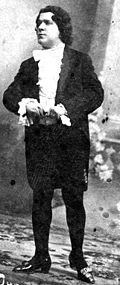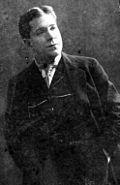Slovtsov was born in Ustjanskoe in the province of Enisejsk. His father, a deacon, died when he was one-and-a-half years old, and
his mother moved to Krasnojarsk when he was five.
Following his family tradition, Slovtsov attended an ecclesiastical school and then the seminary in
Krasnojarsk, where he sang in the choir. Slovtsov's singing was noticed by Pavel Ivanov-Radkevich, a well-known composer and the
seminary's choir-master, who entrusted Slovtsov with solos and gave him singing lessons.
His first appearance was in 1907. After graduation in 1909, Slovtsov entered the law school of the University of Warsaw, but dropped
out only six months later, choosing to attend the Moscow conservatory instead. He studied with Ivan Gordi, graduating with a gold
medal in 1912.
Slovtsov had a busy career: Odessa (1910–12), Kiev (1912–14), Saratov (1914), St. Petersburg/Petrograd (1915–17),
Nizhnij-Novgorod (summer 1917), Tomsk, Sverdlovsk (1918/19, 1930), Irkutsk (1919/20), Moscow (Bolshoj 1929–32) and Leningrad
(1920–30).
In 1918 or 1920, Slovtsov and his wife, the soprano Margarita Rioli-Slovtsova (they had married in 1915) moved to Krasnojarsk. They
stayed until 1928.
Here together with his wife, he organized operatic performances in 1923, and towards the end of 1924, he formed his own operatic
company, primarily with up-and-coming singers. It existed from January to May 1925 and performed: Evgenij Onegin, Dubrovskij,
Rusalka, Tsarskaja nevesta, Faust, Aida, Traviata, Carmen, ...
In 1924, he toured Harbin (China) together with his wife.
Although in 1928
he was appointed
professor at the Russian Academy of Theatre Arts, he continued his appearances in a wide variety of operatic roles.
His repertory included: Vladimir Igorevich, Prince, Vladimir Dubrovskij, Indian guest,
Tsar Berendej, Mozart, Lenskij, Almaviva,
Alfredo, Faust, Roméo, Nadir,
Gérald, Vasya (Vrazhya sila/The power of the fiend by Serov), Duca, Lohengrin, ...
In 1934, Slovtsov caught cold while performing on a USSR tour, and soon died. A monument
to him made of white marble is located at the Pokrovskij cemetery in Krasnojarsk. The inscription is a quotation from Werther:
Pourquoi me réveiller au souffle du printemps.
Slovtsov possessed a strong, beautiful, warm, soft voice with a caressing timbre, amazing respiration, and irreproachable
technique. Contemporaries called him the Siberian nightingale. Critics compared his voice to Sobinov.
Slovtsov recorded about 72 sides for Pathé in 1912 and Gramophone in 1913 and 1914 (Petersburg); for Metropol and
Corona in 1912 (Moscow); for Ekstrafon and Artistotipia in 1913 (Kiev); and Muztrest (1929–30).
Reference 1
Reference 2

